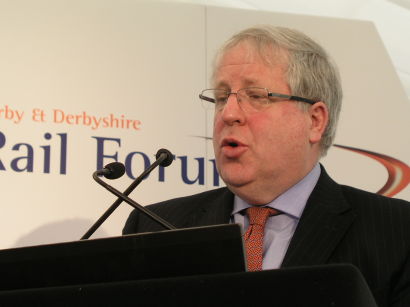THE DEPARTMENT for Transport has almost completely rewritten the franchising programme in response to last year's collapse of the West Coast competition and the following Brown Review.
Nearly all long-term franchise renewals have been pushed back until after the next general election.
Virgin West Coast will now continue from November 2014 until April 2017, but the DfT has given priority to returning the state-run East Coast contract to the private sector before the next election, with a new franchisee expected to take over in February 2015.
Industry leaders said the new programme would restore confidence, but Labour described the delays as 'staggering', while the TUC said the East Coast decision 'defied all logic'.
Some of the extensions are still subject to final negotiations and confirmation, but other key changes affect First Great Western (now to run until July 2016), Greater Anglia (October 2016), London Midland (June 2017) and Southeastern (June 2018). A full official list is available here.
The DfT also revealed that its own company Directly Operated Railways will be standing by to take over if any of the new negotiations fail.
Transport secretary Patrick McLoughlin said: “This programme is a major step in delivering tangible improvements to services, providing long-term certainty to the market and supporting our huge programme of rail investment. Above all, in future franchise competitions we are placing passengers in the driving seat by ensuring that their views and satisfaction levels are taken into account when deciding which companies run our railway services.
“Franchising has been a force for good in the story of Britain’s railways, transforming an industry that was in decline into one that today carries record numbers of passengers.”
The transport secretary is also creating a new Franchise Advisory Panel, which will be headed by Eurostar chairman and franchising review author Richard Brown.
This panel will provide independent advice to support the Department’s work on rail franchising, the DfT said.
Richard Brown added: "I am pleased to see that Government has engaged with my recommendations. It is clear to me that this announcement represents an opportunity for Government to seek competitive and innovative proposals from the existing Train Operating Companies and potential new market entrants to demonstrate how they will continue to improve services for passengers.
“The clarity around the franchise programme will also allow fresh energy to be brought to the urgent task of developing closer partnerships with Network Rail to drive out costs from the industry and provide a better deal for passengers and taxpayers."
FirstGroup chief executive Tim O'Toole welcomed the move, saying: "The publication of the timetable setting out the return to rail franchising is an important development for the industry, enabling the private sector to continue to provide effective and efficient passenger rail services with further performance and infrastructure improvements.
"In particular, the extension of our First Capital Connect, First Great Western and First TransPennine Express franchises provides continuity and consistency for our passengers and enables us to continue to deliver considerable improvements to services."
Network Rail chief executive David Higgins said: "Our goal is to work with the rest of the industry to provide a safer and more efficient railway which addresses the underlying issues of capacity and performance. The clarity provided in today's statement is welcome in helping us achieve that goal."
Speaking for the operators, ATOC chief executive Michael Roberts also agreed with the decision. He said: "The Government has rightly recognised the crucial role the private sector has played, and will continue to play, in delivering a booming railway.
“We welcome the appointment of Richard Brown as chair of the new Franchise Advisory Panel. Train operators look forward to working with the Panel and the Department for Transport to ensure the franchising process works for passengers and taxpayers alike.”
Go-Ahead Group chief executive David Brown added: "The programme announced today will help restore confidence in the franchising process. It is also positive news that the Government intends to restart the Thameslink franchise bid process in September this year to ensure the timely delivery of the Thameslink programme."
The plans have received a bleak reception from the Labour Party. Shadow transport secretary Maria Eagle said: “The full scale of the chaos caused by the Government’s rail franchising fiasco has now been revealed with almost every contract delayed by up to a staggering fifty months. Ministers have still not come clean about the full extent of the losses facing taxpayers as a result of this scandal, despite many industry experts putting the likely cost at well over £100 million.
“It is completely wrong to focus obsessively on an unnecessary privatisation of East Coast, instead of prioritising getting the stalled franchise programme back on track. Ministers must be very careful not to mislead the public as they make their case for this misguided sell-off. It is simply wrong to suggest that planned public investment in the East Coast Main Line by Network Rail and the taxpayer funded order for new InterCity trains would not be happening without this privatisation. The truth is that the current not for private profit operator has returned £640 million to taxpayers and reinvested a further £40 million, profit that in future will be shared with shareholders rather than benefiting passengers.”
Unions, too, are critical of the plan to return the Intercity East Coast franchise to the private sector.
TUC general secretary and chair of the Action for Rail campaign Frances O’Grady said: “This decision defies all logic. Since returning to public ownership East Coast has flourished with passenger numbers and customer satisfaction increasing and all profits re-invested back into improving the service.
“The government, however, is not interested in evidence-based policy and is once again putting the interests of private companies and shareholders before those of commuters and taxpayers.
“This is privatisation for privatisation’s sake, as ministers steadfastly ignore what is best for the rail industry and the people who work on it and use it.”


